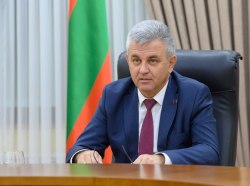Tiraspol, December 8. /Novosti Pridnestrovya/. Prinestrovians understood the danger of signing of the Deep and Comprehensive Free Trade Area (DCFTA) Agreement with the EU to our economy in 2012 when the document was still in the phase of preparation and adaptation. Back then, the diplomatic service started consultations with the European colleagues to establish special trade order. Deputy Foreign Minister Dmitry Palamarchuk has told it on the air of Radio 1 today.
According to him, back then, experts estimated potential loss of the Pridnestrovie's economy when this document would enter force. The loss would amount to about 30−80 million USD a year, a number of textile, garment and shoe enterprises would close and approximately 10 thousand employees would be fired.
«To avoid it, we have conducted arduous negotiations with the European Union throughout 2013−2015, relevant representatives of the Directorate-General for Trade of the European Commission came to Tiraspol 8 times, meetings on the platform of the Pridnestrovie's Government and with the Pridnestrovie's President were held. The final round of negotiations was held in the Ministry of Foreign Affairs in Tiraspol within two days. On the sidelines of the Bavarian conference on confidence-building measures, we had already reached a preliminary agreement which then was transformed to that new trade regime," he told.
The Pridnestrovie's diplomat emphasized that the regime of autonomous trade preferences was termless, that is it had no time limit. Commenting on the possible unilateral changing of the regime by the European Union, he noted that both sides were interested in trade between Pridnestrovie and the European Union.
«I believe that the European colleagues aren't interested in abolishment of this regime because where economic cooperation is established, political, cultural and other cooperation is forged also. It's unlikely that the European colleagues will leave this entire region. If the European markets are closed for our enterprises, EU being an observer in negotiation process will face great risks, because in that case their influence will be actually reduced to zero there," Dmitry Palamarchuk told.








